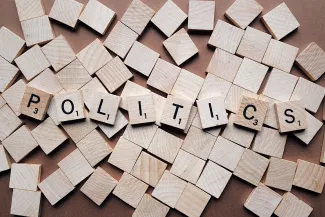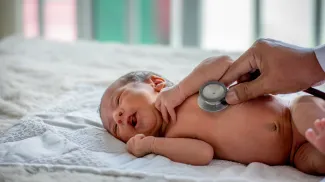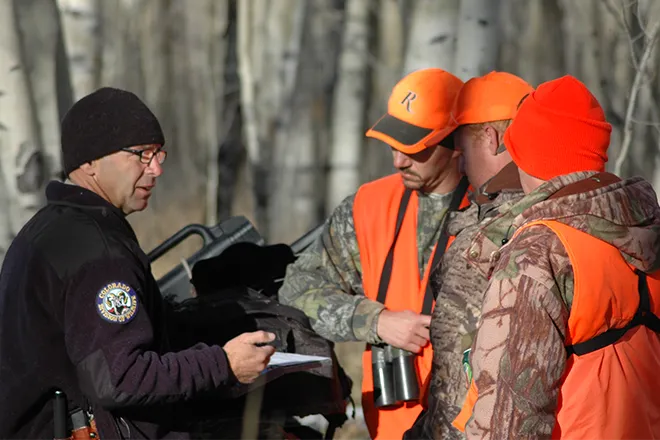
Opposition delays committee vote for Colorado IVF protection bill
A bill in Colorado that would remove some administrative requirements for fertility clinics that help with in vitro fertilization and gamete donation faced pushback on Tuesday from people who were conceived through assisted reproduction. They claimed that the bill would roll back protections Colorado lawmakers passed in 2022.
The House Health and Human Services Committee heard witness testimony on House Bill 25-1259 but, at the sponsors’ request, did not take a vote on it.
The bill would put protections for IVF into statute, one year after the Alabama Supreme Court decision that briefly halted IVF services in that state.

“When the Alabama Supreme Court came down with its decision, I reached out to some of the same people that I’ve done previous work with to talk about if we needed to do anything in Colorado to protect assisted reproduction and IVF,” bill sponsor Representative Meg Froelich, an Englewood Democrat, said. “I was hearing consistently that there were implementation problems with an earlier Senate bill on gamete and donor regulations.”
Froelich is running the bill with Representative Kyle Brown, a Louisville Democrat.
She characterized HB-1259 as a “slight course correction” on the bipartisan 2022 bill by removing some of the enacted requirements that people in the industry say could have a dampening effect on donor participation, and ultimately the success of assisted reproduction, in Colorado. That bill went into effect this year. The goal is to balance donor privacy with the interest of parents and children involved with assisted reproduction to know about genetic and medical history.
Betsy Cairo, the founder of CryoGam Colorado, said donor applications numbered about half what they did last year.
The new bill would eliminate the requirement that fertility clinics and donor banks request updated contact information and medical history from donors every three years. They would only need to get that information at the time of donation.
The bill would also eliminate requirements about record retention and live birth reporting from gamete recipients, allow donor banks to create educational materials for donors instead of the Colorado Department of Public Health and Environment, and change a licensure requirement to every five years instead of annually.

Colorado Capitol Building Denver © iStock - kuosumo
The 2022 bill ensured that Coloradans conceived through egg or sperm donation would be able to learn the identity of that donor when they turned 18 and specifically allows the person to talk about the donor’s identity with family, friends and third parties. This year’s bill would remove that guarantee for family and friend communication and allow clinics to prohibit it.
“We can honor donors’ desire for privacy, while also compelling information to be shared,” Froelich said. “We’re not going back to anonymous donations. We’re not going back to a place where we don’t share critical medical information.”
She said it’s an effort to curb harassment or doxxing — sharing someone’s private information online — of donors, especially with the rise of genetic testing services and ubiquity of social media.
“There are instances of Facebook posts saying ‘This guy is my dad. He’s a dirtbag because he won’t have a relationship with me,’” Froelich said. “We’re trying to swing the pendulum back a little bit to honor some donor privacy.”
But opponents see that provision as a pathway for clinics to require non-disclosure agreements or other communication barriers before telling a person the identity of their biological parent.
“One day after my children turn 18, if they would like to obtain the identity of the donor that I chose, the sperm bank will make them sign a non-disclosure agreement. Essentially, the bank is saying ‘We’ll give you this information about where half your DNA comes from, but you can’t talk about it,’” said Laura Runnels, who has two children conceived through IVF.
Required education materials are supposed to inform donors of the risk, and increasing likelihood, of people conceived through their gamete contacting them when they turn 18.

Former state Senator Steve Fenberg, who sponsored the 2022 bill, characterized the legislation as a “hot mess” to lawmakers in committee. He said there has not been enough time to know if his bill actually reduced donor participation or clinic operation in the state because it has been in effect for two months and the licensure requirement does not kick in until July.
He also argued that IVF is already protected in Colorado’s Reproductive Health Equity Act.
“I believe (IVF protection) is put into this bill, as some of the witnesses have said, because no Democrat in America today would vote against a bill that is pro IVF. That is political suicide,” he said. “The only parts of this bill that actually have an impact policy-wise are the rollbacks of the Donor Conceived Protection Act that was put into law in 2022.”
He said that a “reasonable relaxation” of regulations should include input from people conceived through gamete donation and IVF.
Many donor-conceived people testified in opposition to the bill, including Jamie Spiers with the U.S. Donor Conceived Council. She told lawmakers the bill would gut DCPA before it goes fully into effect, and said there are unclear legal implications for putting IVF protections into the DCPA section of state law. Not all people who utilize IVF use donated gametes.
“This bill has not undergone proper vetting by key stakeholders and will have unintended consequences for many groups that have not been able to provide their input or lend their expertise,” she said.
Froelich told Colorado Newsline that she and Brown plan to offer some amendments, which could include a softening of the third-party communication piece and guidance for donors to report to banks significant medical issues that could be genetic.
“Since we have rolled this bill out, I have had hours of conversations with folks who are donor-conceived, and I have really appreciated their feedback,” Brown said in committee. “We have been working diligently on ways that we can improve this bill to strike the right balance.”
The committee will consider amendments and vote on the bill at a later meeting.
Editor’s note: This story was updated at 10:30 a.m. on March 6, 2025 to include comments from Jamie Spiers and clarify that not all people who use IVF to conceive a child use donated gametes.

















